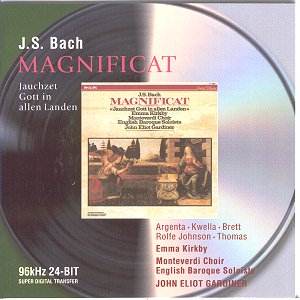Johann Sebastian BACH
Magnificat in D Major (a)
Cantata Jauchzet Gott in allen Landen BWV 51 (b)
 Nancy Argenta, Patrizia Kwella,
Charles Brett, Anthony Rolfe Johnson, David Thomas, Monteverdi Choir (a),
Emma Kirkby, Crispian Steele-Perkins (b) English Baroque Soloists, John Eliot
Gardiner (a & b)
Nancy Argenta, Patrizia Kwella,
Charles Brett, Anthony Rolfe Johnson, David Thomas, Monteverdi Choir (a),
Emma Kirkby, Crispian Steele-Perkins (b) English Baroque Soloists, John Eliot
Gardiner (a & b)
recorded 11 / 1983 in All Saints, Tooting, London.
 PHILIPS 464 672-2
[41.14]
PHILIPS 464 672-2
[41.14]
Crotchet
AmazonUK
AmazonUS
Amazon
recommendations

This is another issue in Philips's 50th Anniversary series. Whilst
I have no qualms whatsoever about the performance or recording quality which
are absolutely first rate, I am somewhat concerned about a CD in today's
marketplace being sold with a total playing time of just over 41 minutes.
I realise that this is probably due to it being issued in its original LP
format, but there are others in this series which are issues of two LPs on
the one disc. Given Gardiner's repertoire and the number of recordings which
he has done for the Universal catalogue there could at least have been added
to this disc some other works by J.S. Bach which would have fleshed it out
to a respectable playing time.
Enough said, what about the performances themselves. The Magnificat
first - speeds on the fast side, phrasing accurate and stylish, singing
quality excellent from soloists, choir and orchestra. What we have here is
the version in D Major (the more popular version) rather than the E Flat
version. The latter was the earlier version and this had recorders rather
than flutes and also had more references to Christmas in the text. The 12
movements are based upon the early Roman Catholic service of Vespers, retained
by the 16th century reformers and sung in Leipzig during Bach's
time in both German and Latin. Bach's first setting of the text was in 1723,
later revised in 1730.
The festive nature of the text has been reinforced by the orchestration which
includes the largest orchestra available to Bach at the time, three trumpets,
drums, flutes, oboes, bassoons, strings and organ. And what a merry noise
they make, especially when played and sung like this.
Bach contrasts the exhilarating movements with contemplative sections, and
all are done here with care and good taste.
The performance is on original instruments, and unlike some ensembles at
the time of recording (1983), Gardiner's orchestra could actually play very
well. The speeds of the various movements are quite exhilarating, but at
no time do the performances seem rushed or hurried. In the two arias where
more than one soloist is used by the composer, the blending and musical intent
are excellent.
Moving on to the Cantata, Jauchzet Gott in allen Landen, BWV 51, we
have one of Bach's church cantatas for solo voice and orchestral accompaniment
which includes a significant part for obbligato trumpet, played here by Crispian
Steele-Perkins. This cantata is Italianate in style, comprising aria, recitative,
and then another aria, followed by a chorale which then leads into a final
Hallelujah, in this case, obviously a solo.
Emma Kirkby's direct, very musical approach to these works is well known,
and this being recorded nearer the start of her career has a freshness about
the singing which I find most attractive.
This is a first class release and well worth listening to, but Oh Dear, the
playing time - come on Universal, who are you trying to kid!
John Phillips

